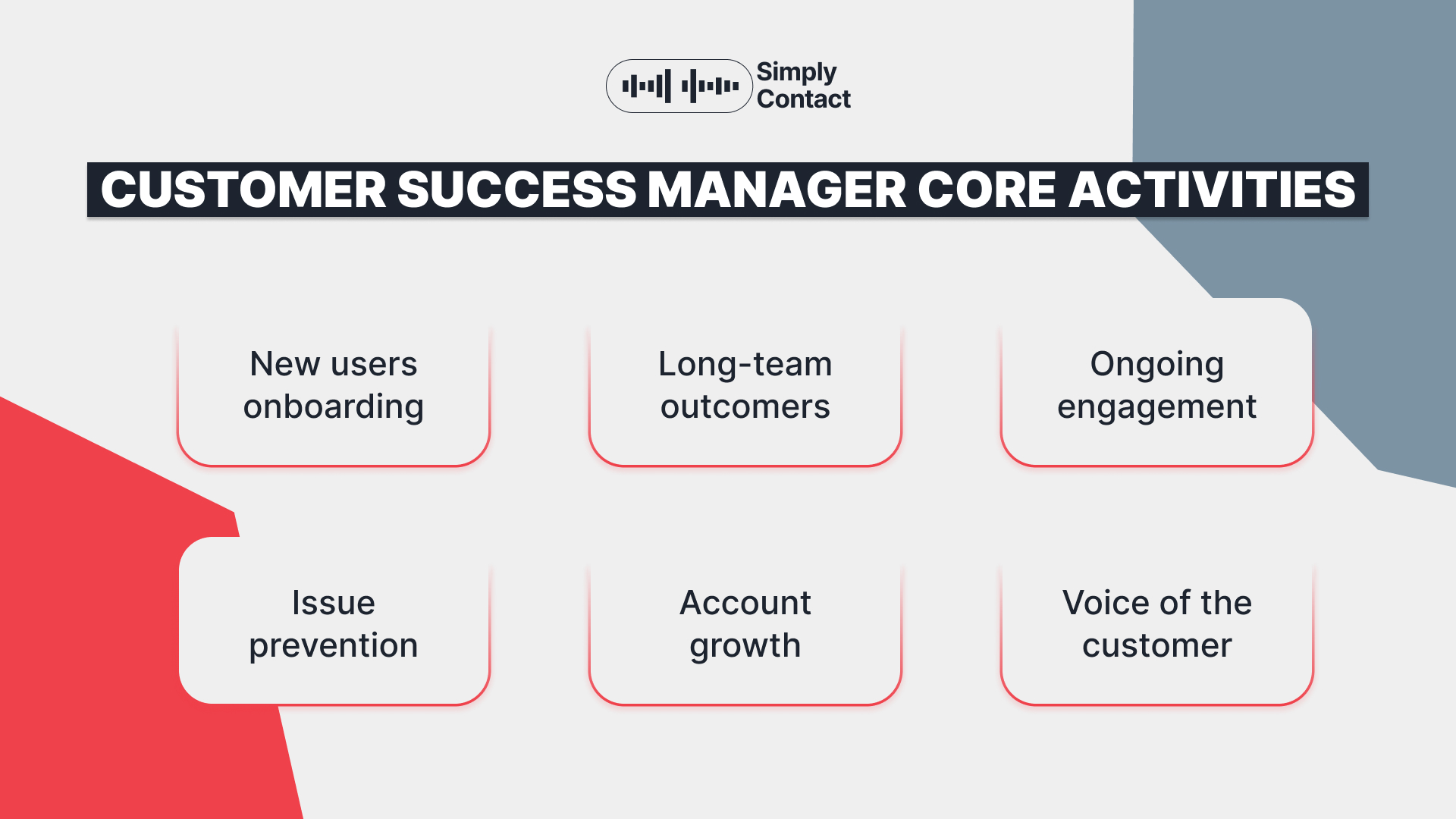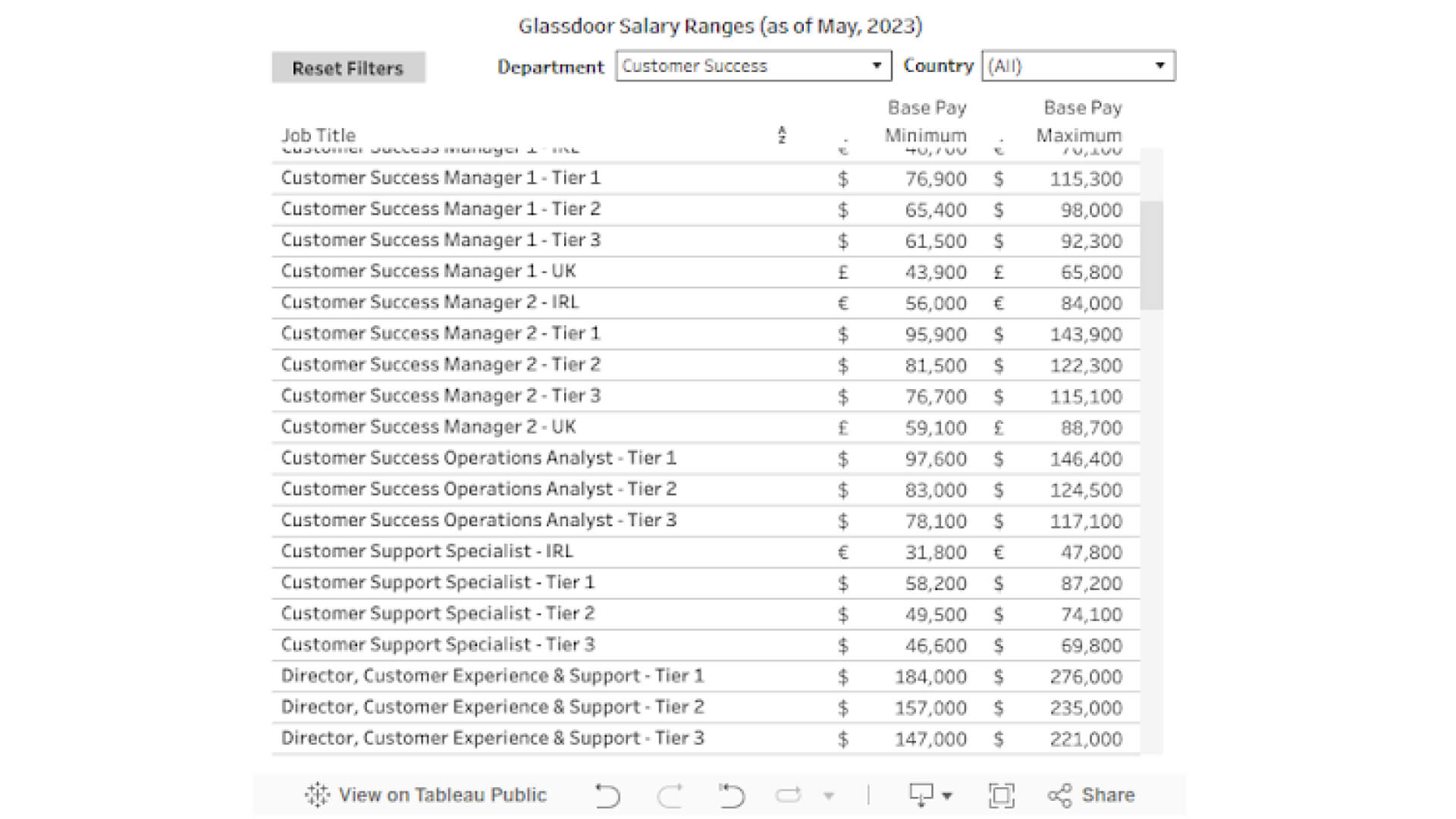At Simply Contact, we specialize in creating personalized customer support solutions that drive business growth and customer satisfaction. Let us help you elevate your customer experience and stand out from the competition.

Customer retention is the primary driver of growth. It leads more companies, from SaaS to outsourcing, to rely on success managers for building better connections with existing buyers. They work with customers, also known as end users, in B2C, and clients (business accounts and decision-makers) typical for B2B.
Today, we are going to share with you our insight into the work and role of a customer success manager (CSM) and their influence on a company's growth. Here you will explore what exactly they do and what skills are vital for the highest manager's efficiency. Join us to discover all you need to know about success managers, from job description to potential salary.
What is a customer success manager?
CSM actively assists customers from the first purchase to active product use. They play a strategic post-sales role, focusing on long-term value and fostering further customer engagement and loyalty. It's a connection bridge between customer support teams and account management. Experienced success managers easily build proactive relationships with both customers (B2C) and clients (B2B). They work to prevent churn and encourage the company's growth.
What does a customer success manager do?
To understand the importance of CSM for a company's success, let's examine the daily activities they perform.

1. New users and clients onboarding
CSM helps new users become more familiar with the purchased items and guides them through the product adoption. They explain how to achieve the best results, using the features customers need the most, and set expectations early. According to the survey, 91% are more likely to make one more purchase after a positive CS experience, so you can imagine how much instant assistance can increase their loyalty to the brand that cares.
2. Focus on long-term outcomes
The customer success manager's role is to understand what success means and looks like for each customer. It's not a one-time fix or response to a request; it's guidance for new purchases that will matter to customers and serve their purposes. They help define what customers want and need to form real expectations from the products. Based on goals and the challenges customers face, CSMs can create success plans to develop an effective support strategy.
3. Ongoing engagement
One of the customer success manager's responsibilities is to ensure that customers are constantly engaged with the products. CSMs maintain their interest in the brand and increase its value through attention to detail.
For instance, CSM can monitor the activity logs and see if the product is used less than usual. Then, they can reach the customer and determine the reason. Such an approach enables prompt assistance and enhances understanding of customers' needs and requirements. They may offer upgrades in time or explain how to use unfamiliar features.
4. Prevents issues proactively
Regular communication with customers and clients helps identify risks before they become real problems. Customer success managers can collect feedback and provide relevant product improvements to drive customer value. Active listening and attention to details enable higher service quality and guide the success plan to match expectations. A CSM can identify bottlenecks in product usage and provide insights into unstable functionality or other issues that require attention from internal teams.
5. Drives account growth
Knowing customers' goals, CSM can more successfully surface relevant upsell and cross-sell opportunities. For instance, if a manager sees that a customer is ready for an upgrade, they can contact them and explain how an additional purchase can serve their goals and what kind of difference it can offer.
As a result, a company can earn more, and the customer or client will receive what serves their purposes, making their experience with the product and services more pleasant.
6. Acts as the voice of the customer
The customer success team can become the voice of the customer and client when it comes to real product use, its pain points, and support requirements. CSM creates a stronger connection between the support team and customers by forwarding technical issues to them. CSMs also get direct insights about products, which they can share with leadership teams. For instance, they can bring the information that many users have asked about a similar feature or service update.
Customer success manager job description
Keep in mind that CSMs are not reactive; they are proactive. They are rather relationship builders who create bridges between the company and customers or clients. With constant assistance and user guidance, they can become a trusted advisor, helping buyers make informed purchases that align with their goals.
Customer success remains the top priority for the CSM manager and drives all communication aimed at engaging customers in actively using the products to achieve their desired purpose.
Top essential customer success manager skills

As an outsourced customer support service provider, we often develop skill-up training strategies, and based on our experience, we have identified the list of skills vital for efficient CSM.
Relationship-building
While frontline representatives usually work on one issue per customer, CSM is dedicated to creating stable and long-term relationships with the customers and/or clients. Both the customer and the client success manager are ready for another issue or request from their contacts. Relationship management enables CSMs to act as trusted advisors, ready to assist with various situations and explain how to use the product most effectively, as well as which upgrades are worth considering.
Strategic thinking
Not all the products are used in the same way. CSM's role is to determine how exactly your company's offerings can serve customers' goals and how they can be integrated with their existing processes to improve them. For instance, depending on the type of work, managers can consider marketing and sales strategies or specific customer needs before making a suggestion. Understanding of the global goals and attempts to achieve them lies at the ground of CSM's strategic thinking.
Communication
If you're thinking about how to become a customer success manager, but phone call conversations and written communication aren't your thing, this role may not be for you. Similarly to a call center agent, the CSM position requires extensive communication with customers, including troubleshooting, consulting, and coaching. It helps know them better and enables higher operational excellence for the manager. So the ability to deliver the information clearly and effectively is a must-have.
Product and industry expertise
To deliver informed advice and a superior customer experience, CSMs must possess in-depth product knowledge and industry expertise. For effective service delivery, a CSM should understand how the services and the company's products work and be aware of current policies to maximize results for customers. Their mission includes troubleshooting and best practice recommendations. The more the manager knows about the industry, the more relevant solutions they can offer.
Commercial awareness
A customer success manager needs to understand how their actions can impact the company's financial state and reputation. Commercial awareness enables effective risk mitigation and helps managers to remain on the path of the company's and customers' success. It leads to informed decisions and helps to avoid offers or suggestions that would harm the brand.
Operational precision
Operational precision makes CSMs trustworthy for customers, clients, and internal teams thanks to their ability to follow internal procedures and perform tasks with accuracy and consistency. The ability to provide insights based on organized customer data serves as a source of valuable information. They combine time management skills with high operational productivity to achieve the desired result in the shortest time possible.
Sales skills
Professional sales managers can effectively demonstrate products and services, driving customers to make new purchases. For instance, knowing what is important to a specific user, a customer success manager can describe how certain features and functionality can be helpful for a particular task. They attract customer attention to relevant offers, carefully nudging them to make a purchase.
Empathy
Empathy in customer service is essential, and so it is for a CSM. With an ability to understand and show compassion, they can more efficiently grow trust and demonstrate support, and wish to assist. Empathetic CSMs can better understand customers' frustrations and expectations, creating a supportive environment during conversations. It increases customers' willingness to cooperate and enables the development of more effective solutions. As a result, they feel heard and valued and put more trust in the brand and their person of contact.
Collaboration skills
Teamwork is vital for customer success managers, as they must collaborate with other teams and departments to enhance the overall customer experience. They may solve some issues themselves, while others require additional assistance from integral groups. Collaboration skills enable the delivery of information about pain points from customers to various teams within the company. As a result, they can work more productively together to find the solution more quickly.
How much does a customer success manager make?
We understand that salary is one of the top priorities when considering a position. To give more information about your chances and payment range, we have prepared an insight based on Glassdoor's current opportunities. Here is a list of the main success manager job titles and corresponding annual wages.

As you can see, the success manager's salary may vary depending on the position and the company's scale, from $76,000 to $143,000. Please note that the payment range may also vary depending on the region and the company's industry sector. The candidate's experience in the industry and role are also key factors in determining potential wages.
Final thoughts
So, what is a CSM? It is a manager focused on customer success who builds a deeper connection with the brand through long-term cooperation and communication. Customer success experts are trustworthy advisors. They demonstrate products and services from the most beneficial sides and explain to users how they can help achieve desired goals based on customers' needs and wishes. CSM’s meaning for the company's growth is hard to underestimate, as they are primarily responsible for driving customer retention and increased loyalty.
With Simply Contact outsourcing customer support, your customers will always feel valued and get quick assistance. Ready for cooperation? Book the consultation now.
Book a consultation
Frequently asked questions
How does a CSM differ from an account manager?
An account manager's mission is to attract new customers and fix individual issues. The customer success manager is dedicated to fostering long-term relationships with customers, with a primary focus on ensuring their satisfaction. They extend accounts and solve issues to drive customer retention. AM is a more sales-driven position, while CSM works as a mentor who ensures the customer gets the maximum from the product or service.
Is customer success different from customer support?
The support agent's primary goal is to ensure customer satisfaction. They solve short-term problems and do not follow up with customers further. Customer success managers strategically guide customers, anticipating their needs and issues before they may need to contact the support team. Their work is not a one-time contact, but rather a constant and proactive communication and assistance. Customer success with products and services is the top priority.
Is a degree a must-have for a CSM?
It's common for a CSM to hold a bachelor's degree, but practice shows that many companies don't require it for a position application. For a customer success manager, experience is more crucial. For instance, businesses are more likely to hire a person with experience in customer-facing roles. A proven track record of successful assistance, combined with a deep understanding of customers' needs and expectations, is vital.
Can you transition into CSM from support or sales?
A change of role may be challenging, but it is possible to transition from one position to another. Customer support, sales, and success teams have different skill sets and approaches to communication with customers. They also have some similarities in their work. You can focus on transferable skills, such as understanding needs and empathy, and utilize them to build long-term relationships with customers in a new position. Experience in directly working with customers and industry knowledge will up your chances.
What makes a great CSM stand out?
The best managers apply customer-first strategies and consistently monitor customers' perceptions of the brand's products or services. They foster long-term communication characterized by empathy and a focus on achieving customers' goals. With deep product knowledge, they can demonstrate all the benefits important for the specific customer and their needs. Connections with internal teams for updates, upselling, and cross-selling are also a great plus.
Get fast answers to any remaining questions
Thank you.
Your request has been sent successfully.
Your request has been sent successfully.






